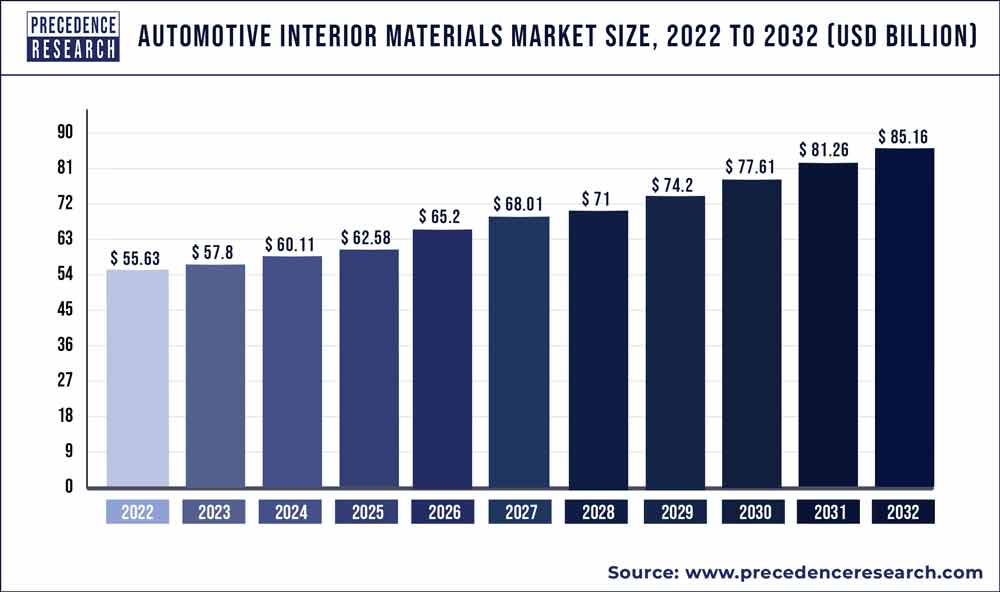The automotive interior materials market size reached US$ 55.63 billion in 2022 and is expected to surpass around US$ 85.16 billion by 2032, expected to grow at a CAGR of 4.4% from 2023 to 2032.

The automotive interior materials market encompasses a wide range of materials used in the interiors of vehicles, including seating, dashboard, door panels, flooring, and other components. These materials play a crucial role in enhancing comfort, aesthetics, durability, and safety within vehicles. The market is driven by factors such as increasing demand for luxury and comfort features in vehicles, technological advancements in material development, and growing consumer preference for personalized and aesthetically appealing interiors.
Get a Sample: https://www.precedenceresearch.com/sample/1265
Growth Factors
The automotive interior materials market is experiencing robust growth due to several factors. Firstly, the rising demand for lightweight materials to improve fuel efficiency and reduce emissions is driving the adoption of advanced composites, polymers, and textiles in automotive interiors. Additionally, the growing focus on sustainability and eco-friendly materials is fueling the development and utilization of bio-based and recycled materials. Moreover, innovations in smart materials, such as self-cleaning surfaces and integrated sensors, are further propelling market growth by enhancing functionality and user experience.
Regions Insights
The automotive interior materials market is geographically diverse, with key regions including North America, Europe, Asia Pacific, Latin America, and the Middle East & Africa. Among these, Asia Pacific holds a significant share of the market, driven by the rapid expansion of the automotive industry in countries like China, India, and Japan. Europe and North America also contribute substantially to the market due to the presence of leading automotive manufacturers and increasing investments in research and development activities.
Report Scope of the Automotive Interior Materials Market:
| Report Highlights | Details |
| Market Size in 2023 | USD 57.8 Billion |
| Market Size by 2032 | USD 85.16 Billion |
| Growth Rate from 2023 to 2032 | CAGR 4.4% |
| Base Year | 2022 |
| Forecast Period | 2023 to 2032 |
| Segments Covered | Material, Vehicle, Application, End-User |
| Key Companies Profiled | Evonik Industries AG, UFP Technologies, Saudi Basic Industries Corporation (SABIC), Arkema, BASF SE, Stahl Holdings B.V. |
Drivers:
Several factors are driving the growth of the automotive interior materials market. One of the primary drivers is the increasing demand for premium and luxury vehicles equipped with high-quality interior materials to enhance comfort and aesthetics. Additionally, stringent regulatory standards related to vehicle safety and emissions are encouraging automakers to invest in advanced materials that meet regulatory requirements while maintaining performance and durability. Furthermore, the growing trend of vehicle customization and personalization is creating opportunities for innovative interior materials that cater to diverse consumer preferences.
Opportunities:
The automotive interior materials market presents numerous opportunities for growth and innovation. One key opportunity lies in the development of sustainable materials derived from renewable sources or recycled materials to meet the growing demand for eco-friendly solutions. Moreover, the integration of advanced technologies, such as artificial intelligence and augmented reality, into automotive interiors opens up new possibilities for interactive and immersive user experiences. Furthermore, partnerships and collaborations between automotive manufacturers, material suppliers, and technology companies can drive innovation and accelerate market expansion.
Challenges
Despite the promising growth prospects, the automotive interior materials market faces several challenges. One significant challenge is the fluctuating prices of raw materials, such as polymers, metals, and textiles, which can impact production costs and profit margins for manufacturers. Additionally, ensuring compliance with stringent regulatory standards and safety requirements poses a challenge for material suppliers and automotive OEMs, especially in regions with evolving regulations. Furthermore, the complexity of integrating advanced materials and technologies into existing vehicle design and manufacturing processes may present technical and logistical challenges for industry stakeholders.
Read Also: Cold Chain Market Size to Reach USD 1,057.19 Billion by 2032
Automotive Interior Materials Market Scope
- Evonik Industries AG
- UFP Technologies
- Saudi Basic Industries Corporation (SABIC)
- Arkema
- BASF SE
- Stahl Holdings B.V.
- Hexcel Corporation
- Continental AG
- Toray Industries Inc.
- Huntsman International
- Sumitomo Chemical Company
- Dow Chemical Company
- Trinseo S.A.
- Borealis AG
- Covestro AG
Segments Covered in the Report
By Material Outlook
- Composites
- Glass Fiber
- Carbon Fiber
- Natural Fiber
- Plastics
- Thermosets
- Thermoplastics
- Leather
- Fabrics
- Others
By Vehicle Outlook
- Passenger Cars
- Light Commercial Vehicle (LCV)
- Heavy Commercial Vehicle (HCV)
By Application Outlook
- Doors
- Consoles & Dashboards
- Seats
- Floor Carpet
- Steering Wheels
- Others
By End-users Outlook
- OEMs
- Aftermarket
By Regional Outlook
North America
- U.S.
- Canada
Europe
- U.K.
- Germany
- France
Asia Pacific
- China
- India
- Japan
- South Korea
Contact Us:
Mr. Alex
Sales Manager
Call: +1 9197 992 333
Email: sales@precedenceresearch.com
Web: https://www.precedenceresearch.com
Blog: https://www.expresswebwire.com/
